The product recommendations in this post are recommendations by the writer and/or expert(s)
interviewed and do not contain affiliate links. Meaning: If you use these links to buy
something, we will not earn a commission.
Cream cheese can be a tasty addition to various dishes, but it’s important to consider its nutrition. While cream cheese is not typically considered a “health food” due to its high calorie and fat content, healthy cream cheese can still be part of a balanced diet when consumed in moderation.
We spoke to nutrition experts to find out exactly what makes cream cheese healthy or not, and the best cream cheese spreads they recommend you buy the next time you’re at the grocery store.
Is cream cheese healthy?
Although many associate this spread with carb-heavy bagels and assume it’s unhealthy, cream cheese can be enjoyed as part of a balanced diet as long as it’s consumed in moderation.
Cream cheese is a good source of calcium, which is crucial for maintaining healthy bones and teeth. Adequate calcium intake is important for overall bone health, especially as we age.
Some varieties of cream cheese are made with added live, active cultures, providing beneficial probiotics. Probiotics promote a healthy gut microbiome, which can have a positive impact on digestion and gut health.
While it contains some beneficial nutrients like calcium, cream cheese also contains fat. Fat is often vilified, but the macronutrient is essential for cellular health, energy, and brain function. At the same time, dairy-based cream cheese spreads do contain saturated fat, of which consuming excess amounts can lead to high cholesterol and an increased risk of heart disease, so you’ll want to be mindful of how much total saturated fat you consume daily.
How we picked the healthiest cream cheeses.
When we were selecting the best healthy cream cheese spreads, there were a few factors we took into consideration.
- Regular-fat: Dairy-based cream cheese does contain saturated fat, but lower-fat versions often contain more fillers than regular cream cheese, such as emulsifiers, flavor enhancers, and preservatives, which can be detrimental to one’s health.
- Lactose-free options: Whether you’re being mindful of saturated fat intake, you’re lactose intolerant, or you’re vegan, there are some high-quality cream cheeses for you. Some spreads made with goat milk or milk alternatives are amongst the best healthy cream cheeses as they’re easy on the stomach and are lower in saturated fat than cow’s milk options.
- No or low added sugars: Flavored varieties of cream cheese contain added sugar and flavorings that may decrease its total health benefits. You’ll want to consider the total amount of added sugar per serving in the cream cheese that you buy.
Read on to find out exactly which cream cheese products our experts recommend and which ones they say you should probably skip next time. Read on, and for more, don’t miss I Tasted 7 Popular Cream Cheese Brands & This Is the Best.
The 7 Best Healthy Cream Cheese Spreads
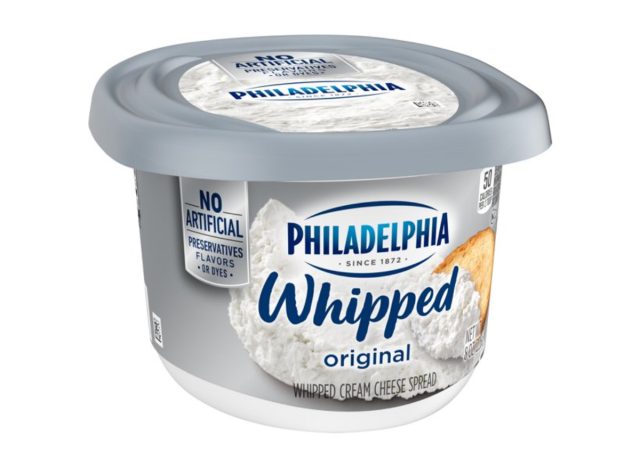

PER 2 TBSP SERVING: 50 calories, 4 g fat (2.5 g saturated fat, 0 g trans fat), 85 mg sodium, 2 g carbs (0 g fiber, 1 g sugar), 1 grams protein
“When it comes to cream cheese spreads, Philadelphia Whipped Cream Cheese Spread is one of my top picks. With its airy texture and creamy taste, it adds a luscious touch to your bagels, toast, or favorite recipes. With a mere 50 calories per 2 tablespoons, it offers a satisfying addition to your breakfast or snacks,” Jessie Hulsey, RD, an Atlanta-based registered dietitian shares.
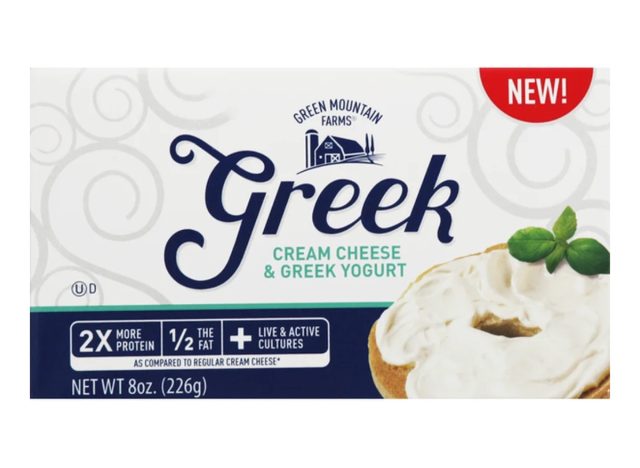

PER 2 TBSP SERVING: 45 calories, 2.5 g fat (1.5 g saturated fat, 0 g trans fat), 65 mg sodium, 2 g carbs (0 g fiber, 2 g sugar), 3 grams protein
What’s not to love about a “healthified” option? We love this variety of cream cheese as it is nearly half the calories and total fat as similar products. Thanks to Greek yogurt, Green Mountain will have you enjoying the delicious, creaminess of cream cheese without added calories.
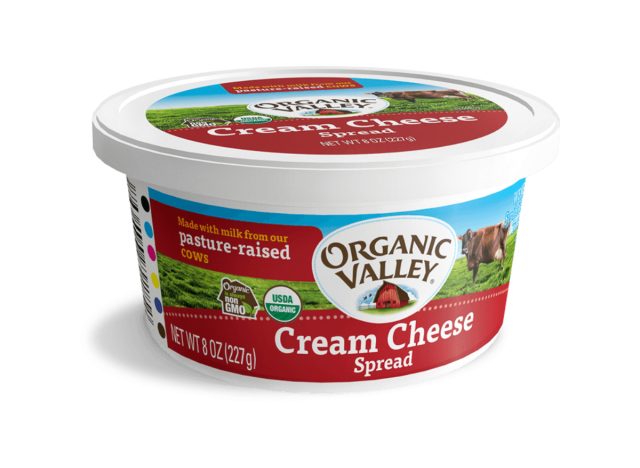

PER 2 TBSP SERVING: 110 calories, 10 g fat (6 g saturated fat, 0 g trans fat), 100 mg sodium, 2 g carbs (0 g fiber, 0 g sugar), 2 grams protein
Wan Na Chun, MPH, RD, CPT of One Pot Wellness shares her favorite cream cheese recommendation: “Organic Valley Cream Cheese is a healthy option for cream cheese spread due to its organic certification, use of organic milk and cream, and lack of GMOs. Being certified organic means that it is free of synthetic pesticides and fertilizers, and genetically engineered ingredients. Made with organic milk and cream, it is free of added hormones and antibiotics. Additionally, it is a good source of protein, which is essential for building and repairing tissues in the body. Overall, Organic Valley Cream Cheese is a nutritious addition to meals and snacks.”
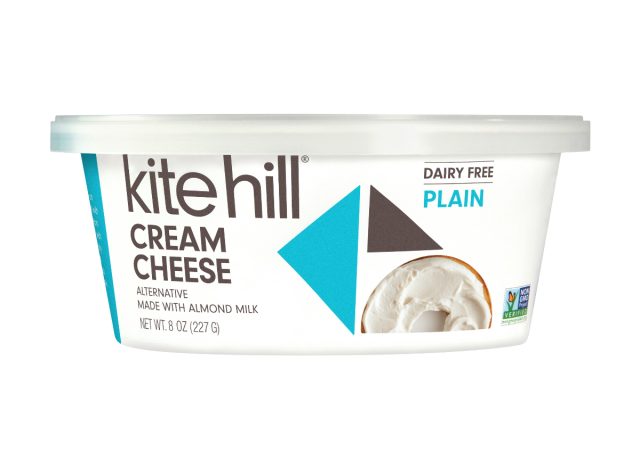

PER 2 TBSP SERVING: 70 calories, 6 g fat, (0 g trans, 0 sat fat), 200 mg sodium, 2 g carbs (1g fiber, 1 g sugar), 2 g protein
Best for a non-dairy option: “With its smooth and creamy texture, Kite Hill’s Almond Milk Cream Cheese Spread delivers a rich, indulgent taste without the saturated fat and cholesterol. Made from wholesome almond milk, it offers a deliciously dairy-free option packed with flavor and live cultures,” Hulsey tells us.
READ RELATED: Trader Joe's Recalled 3 Items In the Past Week—Here's What You Need To Know
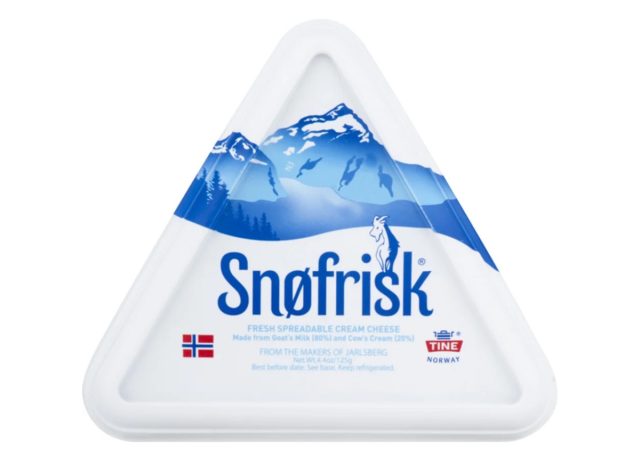

PER 2 TBSP SERVING: 80 calories, 8 g fat (5 g saturated fat, 0 g trans fat), 130 mg sodium, 1 g carbs (0 g fiber, 1 g sugar), 2 grams protein
“Snofrisk is a creamy Norwegian cheese made from a combination of goat’s milk and cow’s milk,” shares Jennifer Akimoto, MAN, RD. “It’s made from the milk of happy goats, wandering the pastures of the Norwegian mountainside, without the use of additives. Since it’s mostly goat milk, some may find it easier to digest. This may be in part due to the fat in goat milk being easier to digest. Some goat milk is also lower in lactose than cow’s milk, which may also improve tolerance for those with lactose intolerance,” she adds.
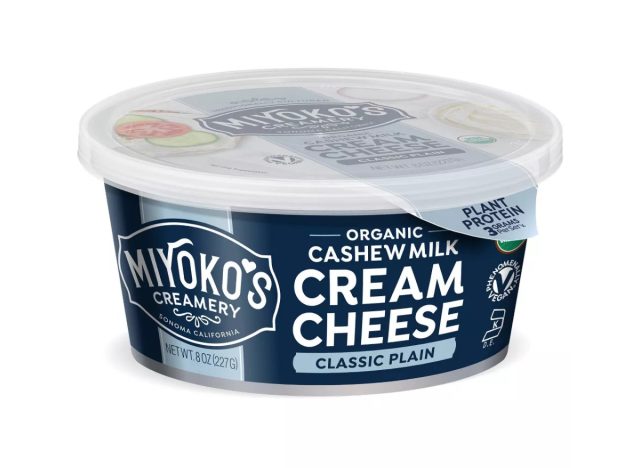

PER SERVING: 90 calories, 8 g fat (2.5 g saturated, 0 g trans fat), 115 mg sodium, 4 g carbs (1 g fiber, 1 g sugar), 3 g protein
You wouldn’t even know this cream cheese is made with organic cashews and is vegan. We love this one as a dairy-free option for plant-based folks, lactose intolerance diets, or for those of you who just want to try something new.
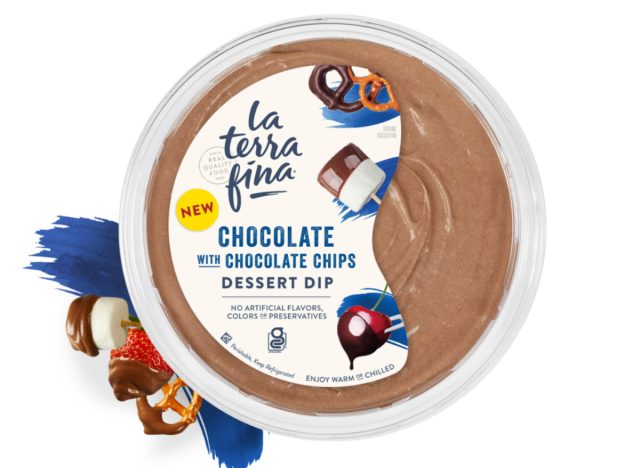

PER 2 TBSP SERVING: 70 calories, 3.5 g fat (2 g saturated, 0 g trans fat), 70 mg sodium, 9 g carbs (0 g fiber, 7 g sugar), 2 g protein
Made with Neufchatel cheese and Greek yogurt, this better-for-you dessert dip is bound to be a crowd-pleaser. Although it does have added sugar for sweetness, it’s significantly lower in total fat and saturated fat than competitor products. We think this dip pairs perfectly with pretzels, fruit, or simply on a spoon by itself.
The 3 Worst Cream Cheeses
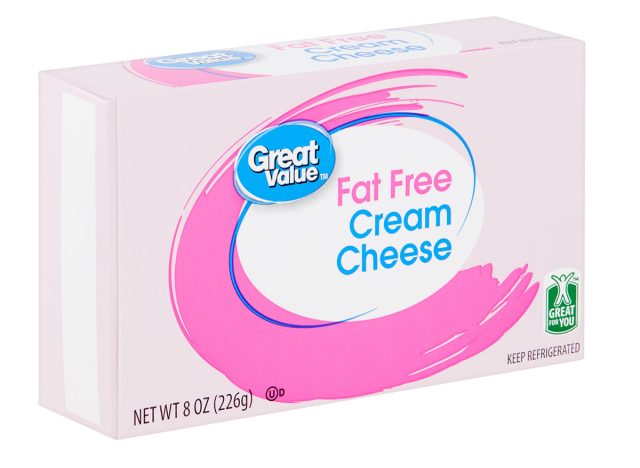

PER 2 TBSP SERVING: 30 calories, 0 g fat (0 g saturated fat, 0 g trans fat), 190 mg sodium, 4 g carbs (0 g fiber, 2 g sugar), 3 g protein
Chun shares her take on why this might not be the healthiest choice despite being fat-free: “Great Value Fat Free Cream Cheese is considered unhealthy due to its high sodium content, lack of flavor, high amount of fillers, and lack of nutrients. Fat-free cream cheese often contains more fillers than regular cream cheese, including emulsifiers, flavor enhancers, and preservatives, which can be detrimental to one’s health. Additionally, it is higher in sodium than other brands, which can contribute to high blood pressure and other health problems. While fat-free cream cheese may seem like a healthier option, it often lacks the flavor and nutrients found in regular cream cheese. When choosing a healthy cream cheese spread, it is important to read the nutrition facts label and choose spreads that are lower in calories, fat, and sodium.”
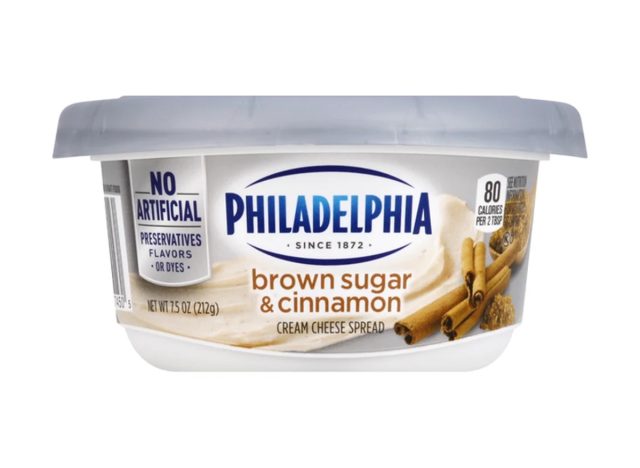

PER 2 TBSP SERVING: 80 calories, 4.5 g fat (3 g saturated fat, 0 g trans fat), 100 mg sodium, 7 g carbs (0 g fiber, 7 g sugar), 2 g protein
“While it may sound tempting, with its sweet profile, Philadelphia Brown Sugar & Cinnamon Cream Cheese Spread has a whopping 7 grams of sugar per serving. Excess sugar consumption can lead to various health issues, including weight gain and an increased risk of chronic diseases,” Hulsey tells us.
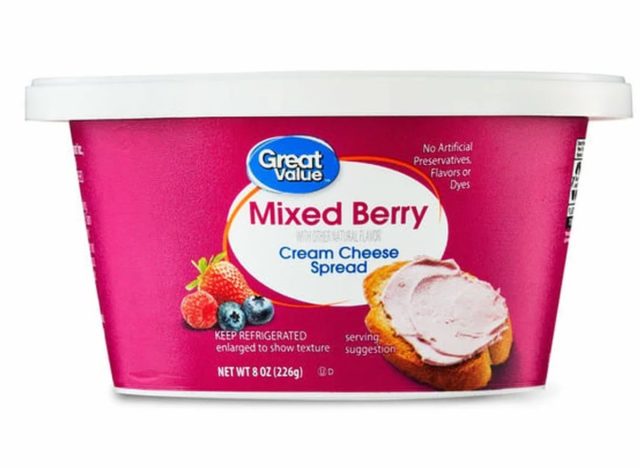

PER 2 TBSP SERVING: 100 calories, 8 g fat (4.5 g saturated fat, 0 g trans fat), 80 mg sodium, 6 g carbs (0 g fiber, 6 g sugar), 1 g protein
This cream cheese has added sugar and flavorings that many folks think give it a bad aftertaste. Its 8 grams of total fat and 6 grams of added sugar don’t do it any favors either. We think you can fare better with a healthier version from our list above.








